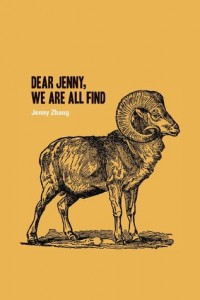25 Points: Dear Jenny, We Are All Find
 Dear Jenny, We Are All Find
Dear Jenny, We Are All Find
by Jenny Zhang
Octopus Books, 2012
116 pages / $12.00 buy from Octopus Books or SPD
1. MOTHERLANDS
“keats was married to vladimir nabakov
they gave birth to my aunt who spoke no Spanish
and colonized all of western Europe
and that’s why michael’s dad ate my left toe leaving me
crippppled”
(“Lifestyle: I Think I Had a Nice Life and Then I Was Doing Weird Things Like Talking About Having a Bad Life”)
2. I started following Jenny Zhang on her blog Fashion For Writers, back in 2007 or something when I made my living selling vintage clothing to places like France for too much shipping and attempting be less insular by people taking photos of what they were wearing in other places. She was in Iowa wearing coats that made me feel like I could survive winter in Ohio and Montreal, where I was planning to move next.
3. Broke and preoccupied with trying to survive winter by books and digging my car out with hot water to get to the thrift store the morning of 50cent tag day, my Canadian neighbor didn’t own a shovel. “Why doesn’t your city know how to buy salt for their streets?!” I stayed mute and poured water and felt mute that winter, representing a city I had exclusively lived in and identified with and clutched at matryoshka dolls from antique malls lining my shelves and wanting to chuck one at my car for living somewhere that made it requisite.
4. I think I owned, like, 10 vintage coats at one point. I got pretty disgusted with myself that winter.
5. A couple weeks back, Heather Christle reposted the caddis fly larvae works of Hubert DuPrat in Cabinet Magazine and posited the idea that poems are analogous to sheaths, constructed from details of our shifting environments. I didn’t set out to write a companion essay review, but 25 bullet points are hard to extract from concepts this immaculately presented as external, when poetry is thought of as a “internal” and “emotional” when it communicates a lot like clothing. Here’s the traditional review reaction I had if I felt differently:
6. “Dear Jenny makes me feel so many more creepyvoyeurfangirl things, like ‘yikes oh yikes I’m exceedingly aware of how we’re reading ancestrally and seeing the sheaths in their past and future relevant form reading anything, into love poems to things and people and continents dead for centuries!!!!!’” Genuinely felt, but I sound twelve.
7. “Family members are resurrected for a second and then blown back to poppy fields before you can say ‘twat.’ Zhang’s incurably dynastic and reads prosaically in its turns and forms, and they’re bratty and fleshly corporeal in each syntactical bowel movement.” Blurb suited for an
Amazon review: discarding.
8. “We are all find she says
bonjour well because
well she is Chinese and anyway
we don’t use R’s”
(“My Mother Leaves Me a Message Where She Pronounces All Romance Languages in a Deep Voice”)
The semiotic problem of “Asian-American” is the book’s seppuku, which I mean gesturing with misappropriation like Zhang does in so many poems. The inherent difficulty of language in relation to identity as American is as blatant as asking “what are you?” to your face, language can answer that anything but in part. If the audiences of the speaker’s voice heard I was from Ohio, they’d think definitely lived near cows and should have a twangy Gummo accent. How many times did I cringe at Harmony Korine’s decision to film in Nashville? Each and every time I moved.
9. It would be better to use a dung beetle analogy instead of the silk casings Octopus Books gives to its larvae. Dear Jenny’s concerns and permutations of scatology is made legitimately profound, or find its profundity is pointed at without making the profane pornographic. Example:
10. “. . .I’ve been coursing through the finite rivers
the smudge of black on yr fingertips and I’m yrs
ya cunt, I’m yrs, yr the cuntiest
cunt I’ve ever cunted” (“Key Phrase”) READ MORE >
March 26th, 2013 / 12:09 pm

